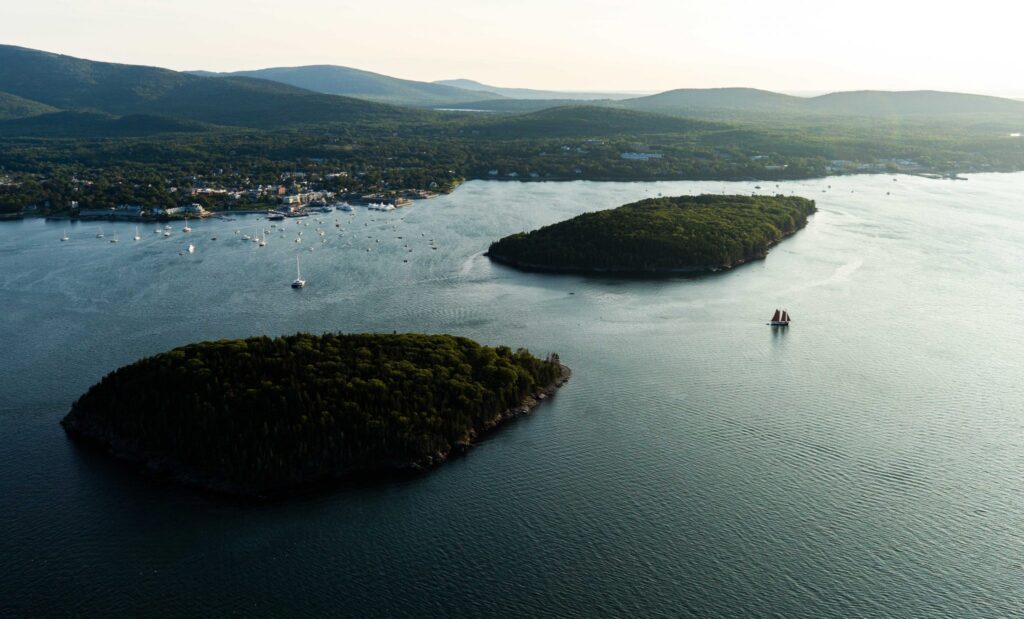Defending Acadia Against Industrial-Scale Aquaculture
September 14th, 2021
September 14th, 2021
The nationally significant gift of Acadia National Park will be tarnished if American Aquafarms’ salmon farms are permitted.

By David MacDonald, CEO and President of Friends of Acadia
For more than a century, landowners, community members and park partners have worked together to preserve the lands and waters that define Acadia National Park. We are blessed by their foresight, and we experience their gifts daily – dramatic coastal scenery, clean drinking water, recreation on the historic trails and carriage roads, dark night skies and the opportunity to restore ourselves in nature.
Acadia’s founders would likely have a lot to say about the proposal by American Aquafarms to construct two 60-acre salmon farms near Bald Rock and Long Porcupine Island in Frenchman Bay. At about the size of 15 football fields, the farms would be an industrial use at unprecedented scale and would rely on unproven technology. They would permanently degrade the park’s scenic vistas, clean air, natural soundscapes and visitor experience.
American Aquafarms proposes to raise 66 million pounds of salmon each year at full build-out, contributing significant amounts of new nutrient pollution to the bay. Each farm would have five diesel-powered 500-kilowatt generators running continuously to keep water flushing through the pens – up to 6,200 Olympic-sized swimming pools of water being pumped through each site daily. The threat of massive industry in the center of the Acadia archipelago is precisely why park founders worked tirelessly to protect the lands of Acadia for future generations to enjoy.
The nationally significant gift of Acadia will be tarnished if American Aquafarms’ salmon farms are permitted. The pens and associated barges and infrastructure would be highly visible from Acadia’s hiking trails, carriage roads and Park Loop Road, as well as from the Cadillac Summit Road, which are all on the National Register of Historic Places. The world-class recreational experience enjoyed by kayakers and boaters on the waters and conserved islands in Frenchman Bay would be greatly diminished.
It is not only scenic viewsheds and soundscapes at risk. Acadia is a Class 1 area under the Clean Air Act, meaning the park is designated to receive the highest level of protection against air pollution and haze.
All of these designations are a testament to the special nature of Acadia National Park and Frenchman Bay. Together they help make this region an economic powerhouse, with the draw of the park contributing over $511 million to the economy and supporting more than 5,400 jobs.
On Aug. 29, a flotilla of 120 fishing vessels and recreational boats from neighboring harbors around Frenchman Bay gathered to illustrate the massive scale of the proposed lease site near Long Porcupine Island and to demonstrate the overwhelming local sentiment against the salmon farms.
This is not about opposing aquaculture as an industry. Frenchman Bay has a long history of small-scale aquaculture operations that live in harmony with traditional uses of the bay, such as lobstering, recreational boating and tourism. Adding two 60-acre permanently fixed salmon farms within a bay that means so much to so many, however, would surely destroy these long-standing traditions of living in balance with each other and the bay, stewarding the natural resource and supporting strong local livelihoods.
The U.S. Army Corps of Engineers and Maine departments of Marine Resources and Environmental Protection face a weighty permitting decision that will affect Acadia’s scenic vistas, clean air and natural soundscapes for the 20-year permitted span of the leases, and potentially beyond if the farms are established, licenses later renewed and potentially expanded.
Friends of Acadia will be working alongside the National Park Service, the National Parks and Conservation Association, Frenchman Bay United and the many other local stakeholders that will be urging these agencies to deny American Aquafarms the permits needed to operate in Frenchman Bay. We owe it to all of those who worked so hard before us and all of those who will follow in future years when places like Frenchman Bay will be that much more rare, valuable and treasured by all.
Read or download full article in PDF format.